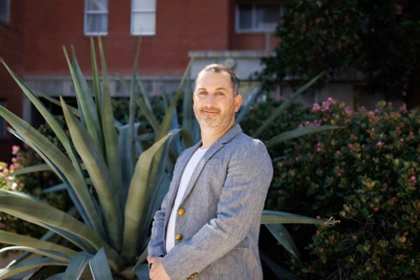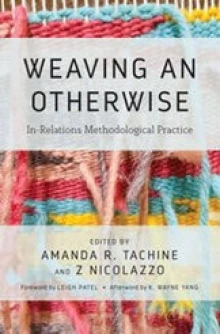Dr. Z Nicolazzo
Dr. Z Nicolazzo is an associate professor at the Center for the Study of Higher Education. She earned her Ph.D. in Student Affairs in Higher Education at Miami University (OH) and formerly worked in various functional areas in student affairs, including residence life, sexual violence prevention programming, and student activities. Dr. Nicolazzo’s research foci include: (1) tracing discourses of gender across postsecondary educational contexts, especially as they influence the livability of trans students, faculty, and staff; (2) transmisogyny as a mode of institutional capture; and (3) affect theory, with an emphasis on grief and loss.

Additionally, Dr. Nicolazzo is a publicly-engaged scholar who translates her scholarship for wider, general audiences, including OpEds for various media outlets, podcast interviews, blogposts, and policy briefs and letters to policy-makers. She also has provided interview commentary on trans people for media outlets such as the Chronicle of Higher Education, USA Today, Refinery 29, and NPR, among others.
Dr. Nicolazzo teaches classes on gender in education, qualitative methodologies, research design, activism in education, and college student cultures.
“I am more than what negative stereotypes and hateful rhetoric suggest.”
Dr. Nicolazzo’s work seeks to imagine liberatory, freedom-oriented futures in solidarity across various communities.

To learn more, check out some of her books:
- Trans* In College: Transgender Students’ Strategies for Navigating Campus Life and the Institutional Politics of Inclusion (2017; Stylus Publishing)
- Weaving an Otherwise: In-Relations Methodological Practice (2022, Stylus Publishing).
- Digital Me: Trans Students Exploring Future Possible Selves Online (2023, Rutgers University Press).
“Unite, share and be in community, and build solidarity across groups so we can imagine better todays and tomorrows.”
What is your favorite quote or person who inspires you as a woman?
The women I draw so much inspiration and purpose from are the trans girls and women who have continually fought to make my life possible. People like Sylvia Rivera, Marsha “Pay It No Mind” Johnson, Jennicet Guttiérez, and Raquel Willis, amongst others, have constantly served as reminders to me that I am more than what negative stereotypes and hateful rhetoric suggest. Lately, I have been so moved by local trans and queer communities, too, especially queer and trans youth who continue to fight for and create the worlds we all need and want. Lastly, I would say my mother has always been a steady inspiration to me. Even though she is no longer alive—she passed in August 2020—her lessons of living slowly and with intention and deep care have provided powerful moments of daily reflection for me.
What obstacles or opportunities have you experienced related to being a woman or to your gender identity?
As I’ve written about in a piece for the Review of Higher Education, academic life is not an easy one for trans women and girls. The specific, entrenched, and prolonged effects of anti-trans animus—much of which is focused on a hatred of trans women and girls, even though it negatively effects all trans people—do not stop at the edge of college campuses. Similar to other trans women, I have also experienced bullying, harassment, and threats, as well as been made to feel like a guest in my own workplace. And while I can sometimes get lost in the difficulties associated with this treatment, I have taken so much solace and heart in the way I and others have been able to build communities of support that provide comfort, even in inhospitable places. All to say, it’s not all bad or good, but often a mix of both, and usually at the same time. And always, it’s been communities of women—trans and nontrans—and especially being in deep community with women of color with whom I have felt the most able to face and make it through the harder days (as well as celebrate during the amazing ones).
What encouragement and advice would you give to students or women in your profession, especially those trying to build a career?
The reminder I often share with students is to remember we are always better together. Especially when it comes to those of us who have experienced marginalization and ostracism for who we are, I think it’s important to remember that we can do what generations of our ancestors have done: unite, share and be in community, and build solidarity across groups so we can imagine better todays and tomorrows. I’m a firm believer that nothing good comes about through solo efforts, so togetherness, community, and collectivities are everything for me.
Most recently, Dr. Nicolazzo’s work has focused on grief and loss, including how grief shapes qualitative research and institutional life. She began this work in 2020 in the wake of losing her mother; however, her focus on grief and loss as animating affects in education have taken on additional significance now as useful frameworks, given the current political and cultural climates related to universities, public schools, and the vulnerable student, staff, and faculty populations who learn and work in them.
Read more Dr. Nicolazzo’s work on grief and loss work in the following pieces:

